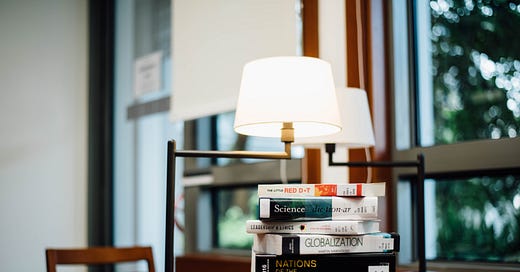Recently, while watching Alex Trebek's final episode of the popular television game show Jeopardy, I discovered a new word that immediately resonated with me….
“Tsundoku”
It’s a Japanese word that describes one's propensity to store up books in mass with the intention of reading them all. It is derived from the words “tsunde” (meaning “to stack things”), “oku” (meaning “to leave for a while”), and “doku” (meaning “to read”).
This practice of squirreling away books like nuts during the winter is a practice I’ve long justified as a healthy outlet. Given my lack of deep friendships, I’ve often told others that books are what fill that missing void in my life.
The earliest signs of this book hoarding habit of mine began to surface in 1985 when I was doing an 8-week summer administrative residency at Evanston (Illinois) Hospital. 4-5 evenings a week after work, I would head over to Chandlers of Evanston, an iconic warehouse space of books, to spend a portion of my $6.00/hour wage on new reads.
To my delight, the dorm room at nearby Northwestern University where I resided quickly became a library for my rapidly growing trove of books. Being quietly nestled away every evening with my literary collection was one of my best reading experiences ever.
Then one night I experienced a terrifying encounter with reality, namely, the sudden realization that my internship was ending and I would have to move out.
“Oh, no,” I thought. “How am I going to get all of these books back to Columbus (OH) for the start of my senior year at The Ohio State University.”
So over the course of the next week, I began the gut-wrenching process of determining which books I was going to take and which ones I would sell back to Chandler’s — albeit for half of what I paid for them. It was an experience I’ll never forget, one that led me to become what I now refer to as a……
Digital Tsundoku.
The invention of e-books has been a godsend amid my nomadic ways as I have moved and lived in numerous states and cities over the course of my life.
Today, it is for this very reason that I am now addicted to digital books on Amazon and Scribd. The vast majority of my purchases are in the $.99 to $3.99 range. I am also a member of Kindle Unlimited (all the books you can read from their designated list for $9.99 per month flat rate) and BookBub, an amazing source of ridiculous book bargains and deals.
And the largesse doesn’t end there — each year without fail, a class action lawsuit is filed against Amazon which yields me a “percentage of all the books I’ve purchased” dollar credit automatically in my account. Whenever this occurs, I’ve been known to purchase up to upwards of $100.00 of e-books in one sitting, the vast majority at the aforementioned discounted rates.
Am I the only one harboring a Tsundoku addiction? Well, hardly. For evidence, check out this piece I wrote featuring Albanian Ardita M Gjeçi whose book collection has swelled to over 4,000 selections. Most of her collection is of the hardback variety which she says creates a great deal of consternation for movers whenever she relocates to a new residence.
It also appears that one of my favorite Medium writers Thomas Oppong has also contracted the Tsundoku virus.
And then there’s Belle from "Beauty and the Beast," who was a total bookworm. Many of you remember the scene where she is simply awestruck when the beast offers his magnificent library to her in this classic Disney movie.
There was a UK study which discovered that on average, over half of the books possessed by individual households have never been read. The average household according to this study has 138 books and 80 of them are unread.
With respect to this point, let me fess up.
Ready?
My own digital collection has ballooned to in excess of 1,000 books! I now read 15 or more books at a time — history books, Eastern philosophy books, technology books, urban planning books, cryptocurrency books, and feminist books. In polymathic style there seems to be no end to my intellectual curiosity.
Honestly, I’ve read less than 20% of them. But according to one of my favorite authors Nassim Nicholas Taleb, author of a collection of books called “The Incerto,” who cares. He espouses what he affectionately refers to as “ the antilibrary,” where he says that unread books are equally or more valuable than the books we’ve already read.
By way of example, he cites legendary Italian writer, Umberto Eco, a prolific writer who allegedly owned a personal library, replete with more than 30,000 books.
Did he read them all? Well, no. But here’s the point —- legions of people were duly impressed by his voluminous trove thinking that this was the reason for his ocean of knowledge and intellect. In the end, says Taleb, his vast book storehouse was a reflection of the things he didn’t know but had a craving to learn.






I tend to download books from the library, so sadly they disappear once I have finished them. However my “to read” shelf is steadily growing past 1,000 😭